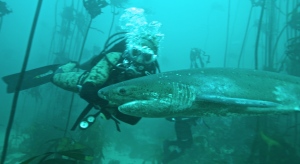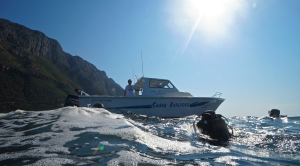From the very beginning of my obsession with sharks the Shark Explorers website has always been one of my favourite places to find pictures and videos of sharks online. Not only do they have amazing and beautiful images, they also inspire others to swim with sharks. They truly love and enjoy being in the water with these animals and encourage others to do the same. It is addictive and something that you cannot fake. They soon became my “dream company” to meet, and for me it was high on my wish list to visit them. Fortunately, the Rolex Scholarship took me there at a time when everybody else in the world were also watching sharks but on Discovery Channel’s famous show: The Shark Week.
I took a train from Cape Town to Simonstown to arrive to meet them. This train goes along a stunning coastline full of surf spots. I arrived just a day after a surfer was bitten by a great white shark at Muizenberg Beach (14 Km. away from Simonstown). Everybody in the town was alarmed by the rare incident and was talking about it for days. There is a very successful project called “Shark Spotters” which seeks to locate sharks visiting a surf area from a high spot on a mountain to prevent these type of accidents. That day there were very poor spotting conditions. The cloud cover was 100% combined with a general haze in the air.
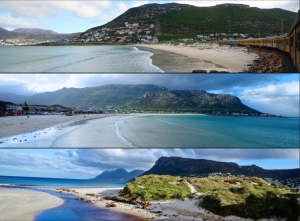
Unfortunately many people in the town were saying that this kind of accident could negatively affect tourism for the town, but like me, many other passengers on the train were coming to see the same shark species from a close perspective! It was unbelievable to see 4 or 5 meters sharks jumping out of the water to catch a seal! I felt like I was in a National Geographic documentary. It was exactly how they show it on TV, but more exciting! Just incredible. But the most fun part was the team of people who work for the company. Obviously the sharks are the centre of the attention, but the reason I went there was to see how these people organise the logistics of putting tourists, from all over the world, in the water with great white sharks. The team makes the experience very exciting, fun and unforgettable. With them I learnt the proper techniques needed to attract great white sharks to the boat in a safe and responsible manner.
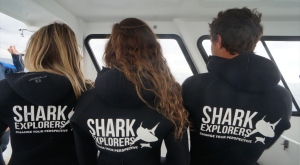
I firstly met the mother and the niece of the owner of Shark Explorers: Ria Hardenberg and Monique Olivier. They welcomed me with a big smile and made me feel at home immediately. The day after, I went to my first great white shark trip! It was amazing to go inside the cage and see these enormous predators from so close! They are impressive animals and to see them face to face is a feeling beyond description. I was actually very scared to be there. The cage looks fragile but I trust it because I know they have been doing this for a long time. This is something I think everybody should do at least once in their lifetime!
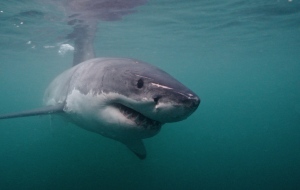
Then I met Morne Hardenberg, one of the founders of the company. He has many years of experience introducing sharks to people both by a direct interaction and through photos and videos. He has participated as a cameraman in many Underwater filming is a special passion and documentaries he has worked on include CNN’s Planet in Peril: Battle Lines; Beyond Fear (National Geographic); SHARKMAN (Discovery); Great White Shark: a Living Legend (BBC Natural World) and Deep Water. He is married to Alison Kock, a shark biologist who is also working with great white sharks! Sadly I couldn’t meet her, but I have read a lot about her interesting research. I think they make a great team because, although they work independently, they combine both disciplines: science and tourism. There is some controversy around the great white shark tourism, because like most of the shark diving operators, they have to use bait to attract the sharks. Some people think that sharks can brome conditioned to this and this leads to a change in their natural behaviour. Therefore there is a general concern that conditioning of sharks to a cage diving vessel would increase the danger to humans. The truth is that we need to cary out research to be sure of what is really happening to the sharks and if this is changing their interaction with humans.
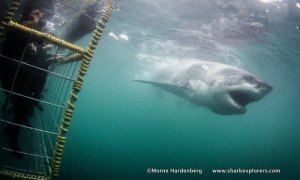
“Without data, you are just another person with an opinion” W. Edwards Deming
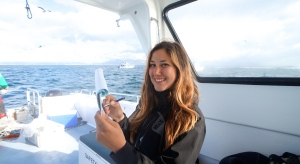
Alison has been researching the potential impact of using bait to attract sharks and you can read about it here.
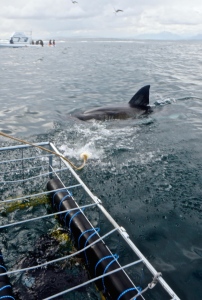
The great white shark tourism industry brings many people to South Africa benefiting the economy of the country. Therefore good management, based on science, is necessary to guarantee the long term sustainability of the industry and conservation of this marine resource. Although this place is famous for great white shark cage diving, there is also the opportunity to dive with another amazing but not so famous shark species, the dinosaurs of the sea: the broadnose sevengill shark (Notorynchus cepedianus). These sharks were a pleasure to dive with because they are very curious and they are not afraid of divers. They sometimes swim so close to people that they may accidentally bump into them. The interaction with this species is so up close and personal that for me felt like I was in a prehistoric Tiger Beach!
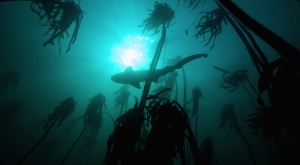
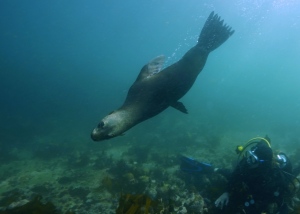
Thank you very much to Morne and to his awesome sharkoholic family team, for giving me a REAL shark week! I learnt a lot about the biology, ecology and behaviour of the powerful great white shark, and I traveled to the past when I met the seven gill sharks (just amazing dinosaurs!!!). I want to be like you guys in the future (but maybe in warm tropical water hehe)! Monique :), Ria, Warren, Ernest, Brandon, Nina, Steph, Brocq you guys are so cool!! Thank you for letting me experience the best shark week someone can have.
